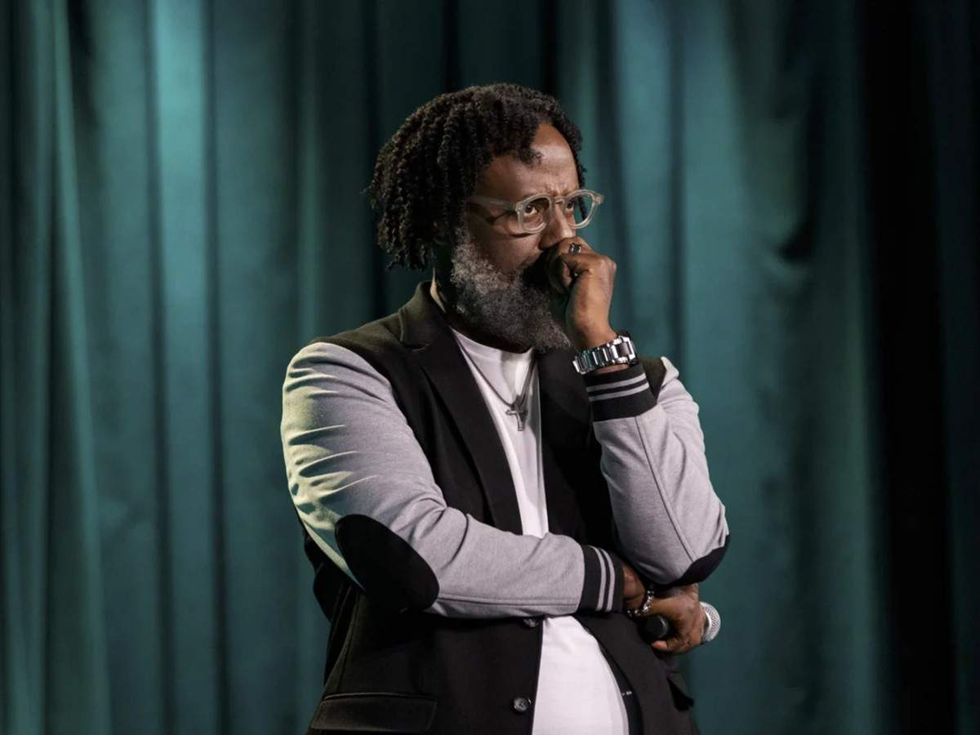Every Saturday, we're ranking every Radiohead song in a worst-to-first countdown of their music. Today's countdown looks at the rankings from #40-31. Tell us what you think in the comments section.
Song 40: "High and Dry"
Album: The Bends
Adobe Flash Required for flash player.
Thom Yorke badmouthed this song off The Bends a few years back in an interview, but an artist is sometimes the most untrustworthy source when it comes to their own material. The list is long of those who wrote songs that they later deemed unworthy even when the listening public would gladly argue otherwise. (Hell, John Lennon wasn’t crazy about “Imagine”!)
“High And Dry” shows the band retreating from all of their loftier aspirations for just a moment and pulling off something delicate and quiet with a great amount of touch. Even though the song was recorded in a haphazard fashion of bits and pieces coming together, it melds into a very satisfying whole.
Every element is well-placed, from the bomping bass drum of Phil Selway that grounds the song on the low end to Yorke’s soaring vocal on the high end. It’s got a refrain tailor-made for wailing along, and that’s a trait that should never be underrated.
Sometimes accessibility gets a bad rap, especially with a band like Radiohead that wears its ambition on its sleeve. But put it this way: How many other hit songs from the '90s sound this good today? Accept “High And Dry” on its own terms, and you might find yourself surprised by just how fine a song it is.
Song 39: "Where I End and You Begin"
Album: Hail to the Thief
Adobe Flash Required for flash player.
You’d be hard-pressed to find a great rock band that didn’t have a killer rhythm section. The bass and drums are often the most underrated element of such success, but their indispensability is indisputable. And I would put forth that the duo that form the bedrock of the songs of Radiohead might get overlooked more than most, especially since the band took on more of an experimental bent, lending the mistaken perception that computers are doing much of the heavy lifting.
Yet a song like this gem off Hail to the Thief would be nothing without the drumming of Phil Selway and the bass of Colin Greenwood. Greenwood’s playing here is propulsive, pogoing around in directions that make this one of the more danceable Radiohead songs. In fact the song has a feel not unlike classic Depeche Mode or New Order thanks to his work.
Meanwhile Selway fires off snare shots and throws in inventive fills that give the song some fire all while keeping a rapid beat. The duo work together seamlessly, which is something that should never be taken for granted at such a quick tempo. Come to think of it, this pair should never be taken for granted at all, nor do I think devout Radiohead fans ever would.
The song gets a boost as well from the directness of Thom Yorke’s lyrics about a relationship fissure, right down to the darkness of his “I will eat you alive” refrain. But Selway and Colin Greenwood take center stage here, and they perform just the same as when they’re out of the limelight: impeccably.
Song 38: "Lurgee"
Album: Pablo Honey
Adobe Flash Required for flash player.
Here we have yet another argument against dismissing Pablo Honey. Deceptively simple and given a title referring to an infectious disease that almost begs people to not take it so seriously, “Lurgee” sneaks up and casts its spell with grace and effortlessness that belie the fact that the song came from such a relatively inexperienced band.
That band would prove on songs like these that they understood how to play with each other, as opposed to some young bands who seem to all be playing for the rafters with no regard to what’s best for the song. Jonny Greenwood and Ed O’Brien are particularly hypnotic here, weaving patterns that interlock and then come undone again in mesmerizing fashion. The rhythm section rumbles along to keep everything moving forward, but never rushing.
Thom Yorke’s simple lyrics read as though the narrator is recovering from some unspoken malady (although we can assume it’s one of the heart), but the heart-rending melody and Yorke’s vulnerable delivery speak otherwise. It reminds me of the simplicity of Kurt Cobain’s lyrics, where unadorned statements were laced with subtext amplified by the music.
Best of all is the extended instrumental section at song’s end, where the band escalates the song to staggering heights without ever showing off. Even as newcomers, Radiohead achieved an unforced grandeur on “Lurgee.” This song was not just a sign of things to come; it’s excellent in its own right.
Song 37: "Subterranean Homesick Alien"
Album: OK Computer
Adobe Flash Required for flash player.
Taking the contrary stance that maybe an alien abduction wouldn’t be such a bad thing, Thom Yorke sings this track off OK Computer as if he’s already floating high above the terrestrial world, looking down on the “weird creatures” who “live for their secrets.” He’s helped on that journey by some of the most ethereal music the band has ever produced.
Jonny Greenwood wrote the intro and the chorus of “Subterranean,” the title an obvious homage to Bob Dylan’s classic card-tossing manifesto. As Phil Selway batters away at a jazzy beat and a heavily reverbed electric piano gurgles in the background, the electric guitars soar quickly through the atmosphere like shooting stars before disappearing.
In the chorus, the reverie is briefly shattered, as the guitars come swirling up more aggressively and Yorke sings, "They’re all uptight." The band creates the mood here so expertly that you start to wonder if they’re from this planet after all. Come to think of it, it might explain some of the unearthly music they’ve made over the years if they weren’t.
Song 36: "Everything In its Right Place"
Album: Kid A
Adobe Flash Required for flash player.
It seems like the more that Thom Yorke repeats the title mantra of this song, the more you feel like just the opposite is true. That’s why the song is the picture-perfect opening to Kid A,the album where Radiohead rewrote all of the rules.
After all, if everything were in its right place, wouldn’t there be guitars and drums somewhere in the mix, as opposed to just an electric piano, coughing out chords that keep repeating but never resolving, unsettling ears looking for a tidy wrap-up?
If everything were in its right place, wouldn’t Thom Yorke’s voice being soaring majestically above it all, instead of being fragmented and distorted into endless mutations?
And if everything were in its right place, would he wake up “sucking on a lemon”?
Much of the great music on Kid A had its genesis on the "OK Computer" tour, and this song first started to arise when Yorke found himself backstage after a show completely unable to speak. His response was to tear up all that he had built, songwriting-wise, and start over again.
“Everything In Its Right Place” is the sound of a man trying to connect directly but constantly being filtered and interrupted. And it’s the sound of the band taking a huge risk trying to fix something that wasn’t broken, and coming out on the other side with a finished product as influential as it was invigorating. In that respect, at least something ended up in its right place after all, that is, Radiohead about a million miles ahead of the curve.
Song 35: "Planet Telex"
Album: The Bends
Adobe Flash Required for flash player.
Born of frustration and heavy imbibing, “Planet Telex” is one of the most important songs that Radiohead ever recorded in that it showed the band that they could approach their music in different ways and still effectively communicate with their audience. But this song, the kick-off to "The Bends," is no mere signpost; it’s a wonderfully intricate and evocative track regardless of its history.
The band had most of The Bends written while they were in the studio recording it, but were stuck one night when they gave up and hit the town. Returning in, shall we say, high spirits, they decided to create a new track using pieces of an old one, specifically the B-side “Killer Cars.” They scrambled up the drum parts to make a stuttering new beat, accentuated by an echo-y piano, and voila, “Planet Telex” was born.
I’d say it’s probably the first Radiohead song that really rewards a headphone listen; all of those disparate sounds provide an immersive listening experience right from the start when that wind sound effect seems to shift and take on a life of its own.
It’s also one of the first songs when Thom Yorke discovered his interpretive powers, although, considering he was three sheets to the wind when he sang it, he probably only discovered them on playback. He toys with the lyric throughout, teasing out the meaning, saving up his power for a big moment in the chorus when he bellows, “Everything is broken.” The lyric itself also insinuates instead of spelling things out, another way in which “Planet Telex” stands out from earlier work.
So you’ve got a lot of firsts rolled up into one song here, but, again, don’t dismiss it as a stepping stone. “Planet Telex” would stand as a fully realized gem even if Radiohead had never played another note.
Song 34: "Knives Out"
Album: Amnesiac
Adobe Flash Required for flash player.
Context is everything, I suppose, but it’s almost comical to hear that Radiohead took a long time to finish recording “Knives Out” because they thought it a bit too straightforward. For most bands, a song as knotty and dense as this one would be beyond the realm of possibility.
I get the point though, in the respect that “Knives Out” grabs you immediately on first listen with those Smiths-y guitars, whereas much of the rest of the music on Amnesiac requires a little more patience, a little more time before they can sufficiently reveal themselves. But don‘t think for a minute that you’ll glean everything you need to know about this song right off the bat.
For example, I’ve listened to it a ton as a Radiohead nut, but I found something new in re-listening to everything again for this list. I was struck by how the tangling electric guitars seem to wait for Colin Greenwood’s bass to make the first move whenever the chords would change, like a little chess match going on between the sections of the band.
I was also struck by the unrelenting bleakness of Thom Yorke’s lyrics when I just read them straight without the music. His voice caresses them in the song as if he’s sighing sweet nothings to a lover, but when you hear his message, vague though it may be, it’s pretty harrowing stuff.
So, in summation, what seems complex to the rest of the free world is no sweat for Radiohead. That says a lot right there, doesn’t it?
Song 33: "There There"
Album: Hail to the Thief
Adobe Flash Required for flash player.
Proving they can be endlessly inventive even within the confines of a conventional rock song, “There There” is one of the most instantly memorable tracks on Hail to the Thief, which the band realized when they chose it as the lead single. That tribal rhythm is just irresistible, an alluring foundation from which all of the song’s other delights spring.
Yorke’s lyrics are never easy to pin down (which is to their credit, in my opinion), but what I get from this song is that he’s asking a lover to sidestep all of the needless, trivial distractions that otherwise might drag them down, or, as he so winningly puts it, are “singing you to shipwreck.” He urges her not to fall for the ruse: “Just because you feel it doesn’t mean it’s there.”
Even more telling is the sweet couplet that he slips into the song’s most congested portion, a pair of lines worthy of Cole Porter: “Why so green and lonely?/Heaven sent you to me.” In the middle of the cacophonous clatter, it’s hard to distinguish these words, which is the point entirely.
It sounds like nitpicking, but I feel like the song becomes a bit too frenzied and dragged out toward the end; to me, the later sections don’t hold a candle to the austere beauty of the jagged guitar set against those hollowed-out drum beats at the start. But it’s a small quibble to make, really. “There There” boils down to the band at its captivating best.
Song 32: "Pyramid Song"
Album: Amnesiac
Adobe Flash Required for flash player.
We mentioned “Knives Out” being on the more accessible side of the spectrum among Amnesiac songs; well, you can count “Pyramid Song” among the growers, songs that defy a quick fix but reveal more and more of themselves with each listen. Only with the passage of time does their inherent brilliance truly show itself.
I’ll be the first to admit that I was a little nonplussed when I first heard the song, from a copy a work friend made off a leak from the Internet. (It was also the first time I’d heard that you could get music off a computer, but that’s another story.) It seemed pleasant enough, kind of mysterious and melancholy, but nothing that blew me away.
But as time passed, I found myself luxuriating in the myriad marvels contained within “Pyramid Song” more and more. The way the quiet piano chords eventually built up to a seductively swirling eddy of sound, washing over me just like the river engulfs the narrator. The way Phil Selway’s jazzy drumming left enough open spaces for the lurching strings and the shrill cries of the Ondes Martenot to buffet me all about. You don’t so much as listen to this song as become part of it.
Thom Yorke’s lyrics, part Egyptian mythology, part Dante, invite you to wade in and find this world where “there was nothing to fear, nothing to doubt,” even if it means renouncing your place in time and space. It’s an impossible invitation to resist.
The moral here is that a song should be judged over time, especially when you’re dealing with masters like Radiohead. If you give it the benefit of the doubt, their music almost always delivers.
Song 31: "All I Need"
Album: In Rainbows
Adobe Flash Required for flash player.
The phrase “You’re all I need” might conjure up images of a flowery love song. But, considering the lyrics that surround it and the moodily magnificent music that accompanies it on this track off In Rainbows, the refrain “you’re all I need” seems to be the ultimate admission of obsession.
The narrator here can only define himself in terms of how he relates to the object of his affection. He’s always outlying, on the fringe, close enough to see her but never to touch. His anguish is kept in check until the song’s end, when he alternately wails “It’s wrong” and “It’s right,” the depths of his torment finally laid bare.
There is a seductive charge to the basic elements of the song: the kicky drum beat and that ominous low riff. It’s disrupted often by bits of white noise, conjured by Jonny Greenwood through studio trickery. There is a subtle sense of disorientation throughout, perhaps due to the fact that the band used different takes for each of the different parts of the song, i.e., maybe the drums from Take 1, the vocals from Take 2, in the final mix.
However they accomplished it, “All I Need” achieves its goal to stunning effect, putting the listener in the mind of this spurned lover, without judging him at all. Besides, it appears the woman in the song has cast the only judgment that matters.





